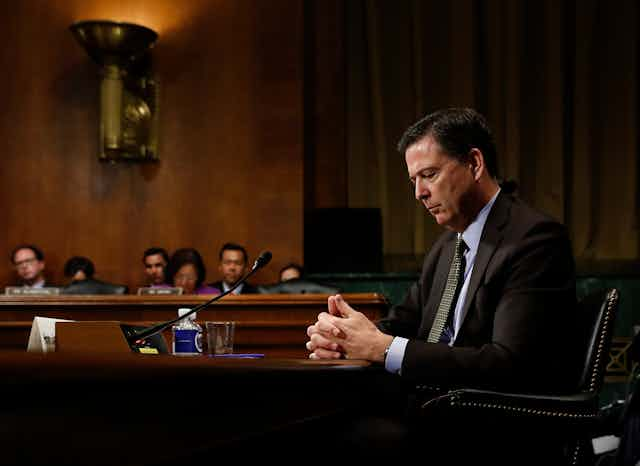There is widespread concern that President Donald Trump’s May 9 firing of FBI Director James Comey is an attempt to stop or delay the FBI’s investigation into Russian interference in the November 2016 presidential election. But little attention has been given to the relationship between Comey’s dismissal and another wide-ranging investigation into the 2016 election.
White House spokespeople and the president himself say Trump let Comey go at the behest of Attorney General Jeff Sessions and Deputy Attorney General Rod Rosenstein.
As a scholar of legal ethics and director of a national institute on ethics and professionalism, I am concerned that Sessions and Rosenstein may have disregarded a federal law safeguarding independent investigations into potential wrongdoing by government officials. I am also concerned that a key inquiry involving not only Comey but also agents at the FBI’s largest field office may never be completed.
Did Comey influence the November 2016 election?

A formal investigation by the Department of Justice’s inspector general was examining Comey’s conduct during the FBI probe into whether former Secretary of State Hillary Clinton properly handled emails. Comey held a July press conference and wrote two controversial letters to Congress in the weeks just before Election Day. Those actions are widely considered to have influenced the presidential election.
Justice Department documents confirm that the inspector general’s investigation, which began in January 2017, had not concluded before Comey was fired.
Rosenstein and Sessions wrote the memos that the White House says led to Comey’s firing, citing the very concerns the inspector general was still examining. But neither man’s memo mentioned the inspector general’s activity – nor the likelihood that summary termination of Comey would prematurely end the investigation. The inspector general is protected by federal law from interference by the attorney general and appointed “without regard to political affiliation and solely on the basis of integrity.” A full and independent report could have been invaluable to public understanding of connections between the email investigation and the election.
Did FBI agents leak information about reopening the Clinton probe?
The inspector general was not just looking into Comey’s own actions. It was also reviewing allegations that “FBI officials improperly disclosed non-public information” and used a Twitter account to publicize the improper release of documents on Oct. 30 and Nov. 1, 2016.
Multiple media sources have reported that Comey was afraid of leaks from the FBI’s New York office about “new emails” relating to the closed Clinton investigation. That fear, reports say, drove Comey to write to Congress about possibly reopening the Clinton investigation, even though it was deep in election season. There are also serious questions about the legality of procedures used by the FBI to obtain and examine these emails.
Just this month, the FBI confirmed that it was investigating a possible insider leak from FBI agents to former New York Mayor Rudy Giuliani, a Trump supporter who was a frequent guest on TV news shows during the campaign season. Before the election Giuliani told Fox News that FBI agents had talked to him about what should have been a confidential investigation into the alleged “new emails.”
The Department of Justice must publicly explain the status of the inspector general’s investigation, and what will become of any findings it might have already made – as well as whether it will continue.

